 |  |  | |
An up close and personal interview with U.S. Army Veteran and Togetherweserved.com Member:
CSM Charles Ross U.S. Army (Ret) (1947-1970)
PLEASE DESCRIBE WHO OR WHAT INFLUENCED YOUR DECISION TO JOIN THE ARMY?
It was my desire for travel and adventure that influenced me. That was in 1947, a couple of years following the end of World War 2.
WHETHER YOU WERE IN THE SERVICE FOR SEVERAL YEARS OR AS A CAREER, PLEASE DESCRIBE THE DIRECTION OR PATH YOU TOOK.
I went through basic training in Ft McClellan AL then a three year overseas tour in Germany with the 1st Infantry Division. I was assigned to the 3rd Battalion, 18th Infantry Regiment/K Company. Orders then came down for an assignment with 3rd Infantry Division in Ft Devens, MA. 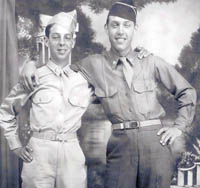 I was there for only four weeks and then off to the 3rd Battalion 8th Cavalry Regiment, 1st Cavalry Division. Soon after I arrived the Korean War broke out. I was there for only four weeks and then off to the 3rd Battalion 8th Cavalry Regiment, 1st Cavalry Division. Soon after I arrived the Korean War broke out.
The war began when the North Korean People's Army (KPA) crossed the 38th Parallel (border separating the North and South Koreas) at dawn on Sunday, June 25, 1950 with a combined arms force including tanks supported by heavy artillery. The KPA easily ran over the South Koreans who did not have any tanks, anti-tank weapons or heavy artillery to stop the surprise attack. The battered South Korean army and their U.S. military advisers quickly were pushed into the Pusan Perimeter, a 140-mile defensive line on the southeastern most tip of the Korean Peninsula. To prevent any further defeat, United Nations Forces were rushed into the war.
The 1st Cavalry Division was shipped to South Korea in July 1950 and immediately thrown into the Battle of Pusan Perimeter. That lasted nearly three month and by October 1950, U.N. Forces had successfully broken out of the Pusan Perimeter and began an aggressive northward advance in pursuit what was left of the now defeated army of North Korea. We moved rapidly north to a place near Unsan, set up defensive positions in the mountain and awaited further orders.
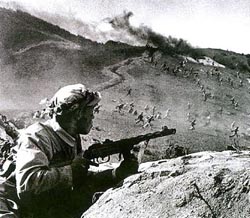 On November 2, 1950 our regiment was overrun by the Chinese Army who had just secretly entered the war. Those of us who were still alive withdrew and after a week of escape and evasion I was captured and remained a Prisoner of War for three years until September 1953. On November 2, 1950 our regiment was overrun by the Chinese Army who had just secretly entered the war. Those of us who were still alive withdrew and after a week of escape and evasion I was captured and remained a Prisoner of War for three years until September 1953.
From 1953-1955, I was assigned to the 1st Battalion, 502nd Infantry Regiment (Airborne)/ A Company, 101st Airborne Division at Ft. Jackson, SC.
1955-1958, I was a First Sgt. in the 3rd Battalion, 35th Infantry Regiment, 25th Infantry Division in Schofield Barracks Hawaii.
1958-1964, First Sgt. at the Engineer School, Fort Leonard Wood/5th Battalion, 4th Training Brigade (AIT) and then the 1st Battalion, 7th Cavalry Regiment/C Company, stationed at Camp Carlson South Korea until 1965.
 My next assignment was for three years at the Armor School/USATCA Special Training Regiment, Ft. Knox, Kentucky when, in 1968, I received orders for Vietnam, ending up in the G-3 office at the 4th Infantry Division in Pleiku. I spend the last of my Vietnam tour in the 1st Brigade, 4th Infantry Division as the Sgt. Major. My next assignment was for three years at the Armor School/USATCA Special Training Regiment, Ft. Knox, Kentucky when, in 1968, I received orders for Vietnam, ending up in the G-3 office at the 4th Infantry Division in Pleiku. I spend the last of my Vietnam tour in the 1st Brigade, 4th Infantry Division as the Sgt. Major.
My final assignment was the Armor Training Center (USAARMC)/ 6th Recon Squadron, 2nd School Brigade (AIT) where I served as the Command Sgt. Major. I retired in 1971.
IF YOU PARTICIPATED IN COMBAT, PEACEKEEPING OR HUMANITARIAN OPERATIONS, PLEASE DESCRIBE THOSE WHICH WERE THE MOST SIGNIFICANT TO YOU AND, IF LIFE-CHANGING, IN WHAT WAY.
 The most significant combat event for me would be in November 1950 when our battalion was attacked by an overwhelming number of Chinese soldiers at night on November 1, 1950. We were able to fight them off for almost three days and nights and as we began to run out of food, water and ammo we were informed that help from other units could not reach us and we would have to fend for ourselves. Those of us that could still walk attempted to escape the perimeter. Most, if not all, were killed, captured or perished in the mountains in the following days. The most significant combat event for me would be in November 1950 when our battalion was attacked by an overwhelming number of Chinese soldiers at night on November 1, 1950. We were able to fight them off for almost three days and nights and as we began to run out of food, water and ammo we were informed that help from other units could not reach us and we would have to fend for ourselves. Those of us that could still walk attempted to escape the perimeter. Most, if not all, were killed, captured or perished in the mountains in the following days.
OF ALL YOUR DUTY STATIONS OR ASSIGNMENTS, WHICH ONE DO YOU HAVE FONDEST MEMORIES OF AND WHY? WHICH ONE WAS YOUR LEAST FAVORITE?
My favorite one was Fort Knox, Kentucky because that's where I was stationed when I met my wife.
FROM YOUR ENTIRE SERVICE, INCLUDING COMBAT, DESCRIBE THE PERSONAL MEMORIES WHICH HAVE IMPACTED YOU MOST?
Surviving the 34 months I was a prisoner of war in North Korea.
On November 1, 1950 my unit, 8th Cavalry Regiment, occupied defensive positions on the high ground south of Unsan when thousands of Communist Chinese Forces attacked our 1st and 2nd Battalion and South Korean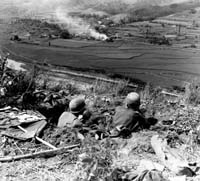 units with three-prong assault from the north, northwest, and west. It wasn't until the early morning of November 2 that our 3rd Battalion with hit with the same "human wave" assaults of bugle-blowing Chinese. For about half an hour, we were fighting hand-to-hand combat before the enemy broke contact and retreated.We had been told elements of the 1st Cavalry Division's 5th Cavalry Regiment and 7th Cavalry Regiment were on their way to help our isolated battalion but when they were driven back. With daylight fading, the relief effort was broken off and we were ordered to get out of the trap any way we could. Breaking into small elements we moved out overland under cover of darkness. Most did not make it (according to official records of a total strength of 800, the 8th Cavalry Regiment lost 600, either killed or missing).After evading the enemy for about six days, I and another member of my squad were captured by Chinese soldiers on November 10, 1950. We were marched north each night for several nights until we reached an unnamed valley. We were then put into a house and kept there until January 1951 and then moved to Camp 5 at Pyucktong where we joined several more prisoners. I have lots of bad memories of that place: Men began to die in large numbers shortly after we arrived. units with three-prong assault from the north, northwest, and west. It wasn't until the early morning of November 2 that our 3rd Battalion with hit with the same "human wave" assaults of bugle-blowing Chinese. For about half an hour, we were fighting hand-to-hand combat before the enemy broke contact and retreated.We had been told elements of the 1st Cavalry Division's 5th Cavalry Regiment and 7th Cavalry Regiment were on their way to help our isolated battalion but when they were driven back. With daylight fading, the relief effort was broken off and we were ordered to get out of the trap any way we could. Breaking into small elements we moved out overland under cover of darkness. Most did not make it (according to official records of a total strength of 800, the 8th Cavalry Regiment lost 600, either killed or missing).After evading the enemy for about six days, I and another member of my squad were captured by Chinese soldiers on November 10, 1950. We were marched north each night for several nights until we reached an unnamed valley. We were then put into a house and kept there until January 1951 and then moved to Camp 5 at Pyucktong where we joined several more prisoners. I have lots of bad memories of that place: Men began to die in large numbers shortly after we arrived. 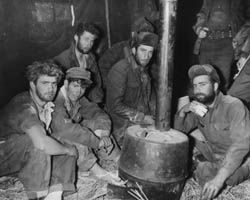 Deaths were almost daily for the next several months. After the weather warmed and food rations were improved the deaths began to taper off but did not stop completely. Men were still dying from disease, malnutrition, untreated wounds and the unsanitary conditions we lived in. We were crowded into small rooms, slept on the clay floors and had no means of bathing or laundering our clothing which were the summer uniforms that we were wearing at the time of our capture. Body lice were rampant and we had neither toilet facilities nor paper products to keep ourselves clean. Deaths were almost daily for the next several months. After the weather warmed and food rations were improved the deaths began to taper off but did not stop completely. Men were still dying from disease, malnutrition, untreated wounds and the unsanitary conditions we lived in. We were crowded into small rooms, slept on the clay floors and had no means of bathing or laundering our clothing which were the summer uniforms that we were wearing at the time of our capture. Body lice were rampant and we had neither toilet facilities nor paper products to keep ourselves clean.
Things began to improve a bit in the spring and that's when the Chinese "Instructors" or "Comrades," as we had be forced to call them, began the daily "brainwashing" lectures that lasted until August 1952 at which time I, along with all the other NCO's, was moved to Camp 4 at Wiwon. The lectures were political in nature and would praise the virtues of Communism and condemn Capitalism.
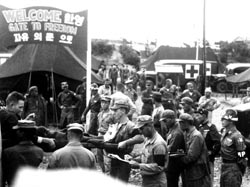 I don't recall any prisoner deaths after moving to Camp 4. Lectures there were less frequent and the content seemed to have changed to "enlighten" us as to how China was always trying to promote world peace and the U.S. was always starting wars. Most of us recognized it as rubbish and tolerated it as best we could. On August 20, 1953 we were informed that an armistice had been agreed to and that we would be repatriated shortly. I was returned to US Army control on September 1, 1953. I don't recall any prisoner deaths after moving to Camp 4. Lectures there were less frequent and the content seemed to have changed to "enlighten" us as to how China was always trying to promote world peace and the U.S. was always starting wars. Most of us recognized it as rubbish and tolerated it as best we could. On August 20, 1953 we were informed that an armistice had been agreed to and that we would be repatriated shortly. I was returned to US Army control on September 1, 1953.
I would have to say that it was not a pleasant experience but given the fact that I had enlisted voluntarily and that we were at war I accepted my fate and made the best of it.
IF YOU RECEIVED ANY MEDALS FOR VALOR OR AWARDS FOR SIGNIFICANT ACHIEVEMENT, PLEASE DESCRIBE HOW THESE WERE EARNED.
Bronze Star for Meritorious Service in Vietnam, two Army Commendation Medals for Meritorious Service at Fort Leonard Wood, Mo. and one at Fort Knox, KY.
OF ALL THE MEDALS, AWARDS, QUALIFICATION BADGES OR DEVICE YOU RECEIVED, PLEASE DESCRIBE THE ONE(S) MOST MEANINGFUL TO YOU AND WHY?
 Combat Infantry Badge 2nd award. I think it shows that you've been in one of the Army's most dangerous and difficult jobs. Combat Infantry Badge 2nd award. I think it shows that you've been in one of the Army's most dangerous and difficult jobs.
WHICH INDIVIDUAL(S) FROM YOUR TIME IN THE MILITARY STAND OUT AS HAVING THE MOST POSITIVE IMPACT ON YOU AND WHY?
T/Sgt. Harvey Brown. He helped me as a young soldier to break away from the "Crowd" and encouraged me take leadership courses that helped up my ranks and eventually a decision to make the Army my career.
M/Sgt. William Hamilton. Helped me to learn and understand the complexities of being a First Sergeant.
CAN YOU RECOUNT A PARTICULAR INCIDENT FROM YOUR SERVICE WHICH MAY OR MAY NOT HAVE BEEN FUNNY AT THE TIME, BUT STILL MAKES YOU LAUGH?
 As a young sergeant, I was assigned as color bearer for the National Colors at a congressional welcoming ceremony while I was stationed in Germany. As we marched to the parade ground we had to go up a very steep bank and the grass was wet. My foot slipped and I fell to one knee and as a result I ripped my trousers. After a rapid recovery we continued to our designated place on the field. The Regimental Commander looked at me and then told me that I should be ashamed for wearing a damaged uniform while bearing the Colors. Not very funny at the time but when he found out what had happened we laughed about it and he apologized. As a young sergeant, I was assigned as color bearer for the National Colors at a congressional welcoming ceremony while I was stationed in Germany. As we marched to the parade ground we had to go up a very steep bank and the grass was wet. My foot slipped and I fell to one knee and as a result I ripped my trousers. After a rapid recovery we continued to our designated place on the field. The Regimental Commander looked at me and then told me that I should be ashamed for wearing a damaged uniform while bearing the Colors. Not very funny at the time but when he found out what had happened we laughed about it and he apologized.
WHAT PROFESSION DID YOU FOLLOW AFTER YOUR MILITARY SERVICE AND WHAT ARE YOU DOING NOW? IF YOU ARE CURRENTLY SERVING, WHAT IS YOUR PRESENT OCCUPATIONAL SPECIALTY?
First: Retail sales in a family owned furniture store for 14 years.
Second: Owned and operated a cattle farm for 24 years.
Now: Part time work in a local funeral home and enjoying life and the grandkids.
WHAT MILITARY ASSOCIATIONS ARE YOU A MEMBER OF, IF ANY? WHAT SPECIFIC BENEFITS DO YOU DERIVE FROM YOUR MEMBERSHIPS?
DAV Chapter 20, Glasgow, Kentucky.
IN WHAT WAYS HAS SERVING IN THE MILITARY INFLUENCED THE WAY YOU HAVE APPROACHED YOUR LIFE AND YOUR CAREER?
It has helped me to understand the importance of discipline, as well as keeping everything in my life organized and to obey the rules of law.
BASED ON YOUR OWN EXPERIENCES, WHAT ADVICE WOULD YOU GIVE TO THOSE WHO HAVE RECENTLY JOINED THE ARMY?
 If you decide to make the Army your career, I would advise you to separate yourself from the "Crowd" and be careful of whom you choose to be your friends, educate yourself at every opportunity. Always do your best and show enthusiasm when given a task. If you decide to make the Army your career, I would advise you to separate yourself from the "Crowd" and be careful of whom you choose to be your friends, educate yourself at every opportunity. Always do your best and show enthusiasm when given a task.
IN WHAT WAYS HAS TOGETHERWESERVED.COM HELPED YOU REMEMBER YOUR MILITARY SERVICE AND THE FRIENDS YOU SERVED WITH.
It has brought to mind many years of memories that I probably would not have had if I had not found this site.
|
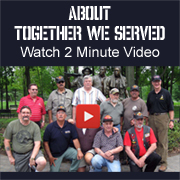

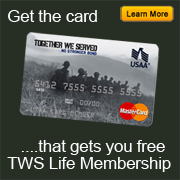

Read Other Interviews in the TWS Voices Archive | Share this Voices Edition on:


  |
|
TWS VOICES
Voices are the personal stories of men and women who served in the US Military and convey how serving their Country has made a positive impact on their lives. If you would like to participate in a future edition of Voices, or know someone who might be interested, please contact TWS Voices HERE.
This edition of Army Voices was supported by:
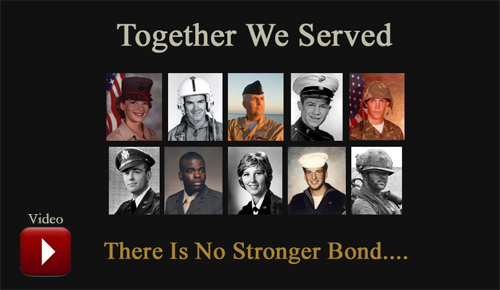
Army.Togetherweserved.com
For current and former serving Members of the US Army, US Army Reserve and US Army National Guard, TogetherWeServed.com is a unique, feature rich resource helping Soldiers re-connect with lost Brothers, share memories and tell their Army story.
To join Army.Togetherweserved.com, please click HERE.
| |